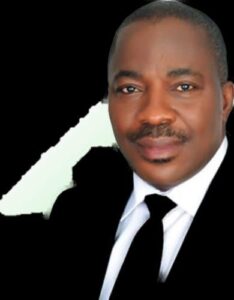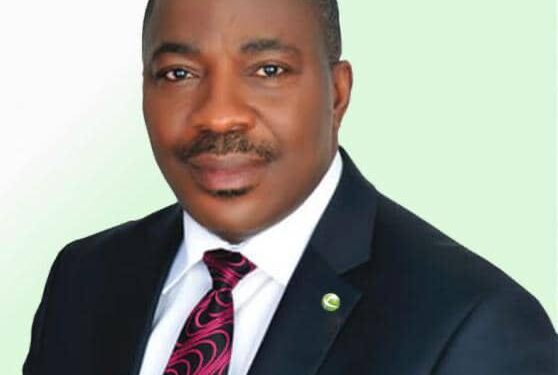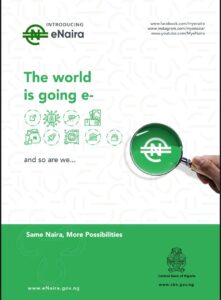Mr. Wilson Ideva, the MD/CEO of First Guarantee Pension Limited, is one of the most successful Chief Executives. He is reputed for lifting struggling PFAs to success. He has been CEOs four times, an accomplishment no CEO has achieved in the industry. In this explosive interview, he speaks go his carrier and the impact of the pension industry.
Can you walk us through your money in the pension industry?
My journey in the pension industry has been quite intriguing, but looking back, I thank God for what He has helped me achieve. My journey in the industry started in 2007. I had just returned from England. I got a job at First Guarantee Pension Ltd and surprisingly within three months, I was made the MD/CEO. I resumed on 2nd Oct 2007 and I was made the MD/CEO on 19th December 2017. I was appointed MD because the MD I met, unfortunately, didn’t get the approval of PenCom. So, my documentation was sent to PenCom and they approved it. That was how I started as CEO. At the time, the company wasn’t doing well because the shareholders’ fund was burnt. The staff were unmotivated, had CV’s in their pockets, and looking for other jobs. I didn’t blame them because of the scenario. So, I said how do I motivate the staff and make them have confidence in the company? Because without human capital, you can’t do anything. Thus, we first guaranteed salaries for a minimum of two months for all staff. Previously, we paid junior staff and later the management staff. To guarantee the salary, I approached the bank for an overdraft and they demanded collateral, I said I was the collateral because the company had no fixed assets. It was intriguing. I told them I have confidence in what I’m doing but after a drag, they accepted. We overcame that and grew the company. When I came in, the assets under management was about N2 billion but in 2011, we had grown the assets under management to N38.4 billion. Suddenly, hell was let loose. We had a lot of challenges and they wanted to take over the soul of the company in all manner of disguises. As the CEO, some of the issues they brought, I didn’t buy into them, I stood my ground. They tried to compromise with me, but I refused. I don’t want to mention specific details but I was advised to resign, so I did without looking back. Technically I was booted out. After I left, we all know what happened to the company. The regulator came very hard on them. Did some examination, found some infractions, dissolved the board, and an interim management team was formed. When I was booted out. After a while, a friend called and told me of an opportunity at Penman Pension Limited, which later became Tangerine Pension. I don’t what it is now. The Chairman then was the great maru Mutallab, the great corporate wizard. They wanted a CEO. I met the board and they said I was highly recommended. They said they will pay what I was being paid in FGPL and that I should draft my employment letter. That was how we started. Then Penman Pension Limited PFA was the smallest PFA. I said how come I’m being taken to the smallest PFA to start all over again. I can’t remember the figure I met at Penman Pension Limited but it was down the line. Every company has its issues – big or small and I met issues. I found two problems. The human capital was insufficient and the infrastructure was lacking. We started with physical infrastructure. We improved them and fixed the office environments. Three weeks later, when the board came, they were shocked at the office. We brought life into it. My colleagues are lending some support to make me succeed, maybe because of what happened to me. We also changed the software because it was too huge and expensive for our operations. We were also mindful of the fact that we have to be profitable. When it was getting to a year, something in 2012. I got a call from a friend and he invited me to meet some people. They turned out to be board members of Premium Pensions. I member what came out from the mouth of the Chairman then was that you are now our MD. I said that can’t be true sir. They asked why? I said I have a job that I’m barely a year and trying to settle down, they said they know. The next day the Chairman called me, we met and he said my offer letter was ready. Imagine leaving the MD of Penman to Premium Pension, is like leaving the MD of tier three bank to tier one bank. It was hard for me but I summoned courage. At Premium Pension, our asset under management was N224bn. Of course, I looked at the challenges that existed and what I could do to improve the place. I discovered staff weren’t time conscious, and there was no synergy in spite all the potential. We gave our peers a good fight. I spent 5 years and before I left, we were close to N560bn assets under management. I was privileged to have Board Chairmen that mentored me. So even at Premium Pension, it was the same thing. I go to my chairman to discuss my plans. At Premium Pension their retirement age was 55yrs. Which was quite young. I retired at 55. I said what next? I had decided not to go back to industry as a staff after being CEO of three PFAs but to give back to the industry through consulting. I established High Street Consulting. I got all I think I needed to run it and began work. In the first year of operations, our turnover was close to N50 million, which wasn’t bad for a start-up. In the second year, 2019, our turnover was again, close to N60 million. We got a lot of support in the industry. in 2020, COVID struck and we shut down and we were thinking of what to do.
So how did you return?
In April 2020, I got a call from Alh. Kashim Ibrahim Imam. He said FGPL has been handed over back to the shareholders with a Board headed by him. I quickly proposed for them what they needed to do to revamp the company as a consultant. Because the handover was with some conditions. He looked at it and said that’s not want they want. That they want me to come back as the CEO. I refused and offered my support because the company gave me my first opening into the pension industry. Several people begin to call me to return and it became an emotional thing, especially with my previously stay there. Even my wife was against it but I convinced her and I resumed 18h of may 2020.it was a difficult job because of the several conditions from PenCom but by God’s grace, we fulfilled all the conditions. We settled all the shareholders except the ones I wasn’t able to trace. The staff were brought back to life. We paid dividends and we were about to settle down for growth when Access Corporation bought into the company. The Board in their wisdom said they wanted a bigger corporate name. and there was this new recapitalization that raised shareholders’ funds to N1bn as against N1bn. This gave rise to Access Corporation’s major stakes. Access also bought into Sigma Pensions. We are in the process of a merger and hopefully, in the next few weeks, there will be Access Pensions Limited – a combination of FGPL and Sigma Pensions Ltd. After the merger, I will also be exiting the industry. Someone asked, where next? I said this time around, I will not be returning as the CEO of a PFA. I will still be at the background supporting through Highstreet Consulting.
In second the coming to FGPL, what are you leaving behind?
This second coming has been very fruitful. We have been able to build staff confidence. One of the decisions we also took, was to build a good corporate office since we moved our head office from Lagos to Abuja. We have built a big edifice complete with modern facilities and ICT infrastructure in Wuse 2, not far from PenCom. We built that property in one year and without a bank loan. the Board led by Kashim Ibrahim and I as the CEO will be remembered for this. Also, shareholders now get better returns on investments. For Access Corporation, one of the most aggressive institutions with the largest bank network in Africa to be interested in PFA with assets under management slightly below N300bn, there must be something they are seeing in FGPL Through this transition, shareholders of the companies have been made rich through the premium payment on their shares. We also recovered the shareholders’ assets and refocused the company with assets under management of about N295bn.
We have been grappling with inflation for a while, what has been the impact on pension assets investments yield?
Since the middle of last year, PFAs have been returning above inflation. That means that the yield has real value. If inflation is 9% and you return 12%, that means 3% is your real value. Now with inflation at 21%, no PFA is returning up to that. So, in real terms, we all experience some losses. But it won’t be long because it is a global crisis. Even in the UK, inflation has reached an unprecedented 11 percent. But we see growth ahead. In the past year, FGPL has been top in return on investment. Collectively, we have been number one in most of the funds. We should be number three in terms of return on investments.
Does this impact retirees too?
For retirees, it has been quite intriguing, because of the way their retirement has been so calculated, most of the returns are far more than what we pay to them so most of their funds remain intact. Retiree funds cannot be exposed to risky investments. Returns must be guaranteed. It has given a lot of comfort to retirees’ funds. That is why every two years, there is an increment in what we pay retirements (enhanced pensions.)
Recently, paramilitary organisations, have been agitating to exit the contributory pension scheme because of the seemingly low pay they receive. Can anything be done for them to earn better and still remain?
As an industry, a lot of suggestions have gone to the government on what they could do to stop these agitations. Yes, most of their pensions are low but under the CPS, you own your funds. The people who are suffering this now, are people who haven’t contributed that much. The industry started n 2004. But for those who are still in the scheme, 20 years from now, their contributions will be huge and their payout better. Those who may be complaining are those who retired 10 years or so after the scheme, their contributions will be low and their payouts low as well. Pulling out from the scheme is moving from frying pan to fire. If you recall before the CPS, the challenges they faced in accessing their Penson were huge. If you were here in Abuja then, they took over the streets, protesting their payment. Do they want to go back to that era, the answer is no? do they deserve a better payout, yes! How could they get it? The parties can sit down and discuss. We have to have a holistic view of this. If they pull out, does the government have the money to pay them? No. it is best we evolve ways to argue it but pulling out shouldn’t be an option.
Has the transfer window really gained traction?
The Transfer window is a win for the RSA holders. It has been a burden of service on all PFAs. If the RSA doesn’t get good service, he or she moves to another. All PFAs have been put on their toes. On a quarterly basis, we see the movement of funds. Thus, the PFAs will have to provide superior services and put a human face to them. The transfer window is good for the industry. RSA holders are really moving from one PFA to another. But I counsel that before you move, there should be a good reason. Look at the return on investments on your funds before exiting. don’t just move for the fun of it.
The micro pension scheme is still struggling, how can we deepen it?
Going forward, we can partner with the banks and introduce a policy where if you have a microloan, you must also have a micro pension plan as part of the guarantee to pay back. In the industry, we are making a lot of progress. We are working with trade unions, market associations, etc to see how they can come under one umbrella. The guidelines also show that the contributions will be kept in two parts. One as savings and the other as pensions as an incentive. We are also seeing how we can make contributions driven by ICT. All PFAs are working on this. Our biggest challenge in Nigeria is identity like other countries have. If we sort out the issue of identifying every citizen wherever he or she might be, it will also grow micro pension.

Can you access the impact the CPS has had on the economy generally?
It is quite enormous. The value of the pension assets now is over N16trn. The money is not sitting in one place, it’s in various sectors of the economy. If you look at the FGN fixed-income market, about 60 percent of pension funds go there. We would have had more inflation if not for the pension assets. If you look at the banks, most banks are being kept afloat by pension assets. Maybe they would not have had the ability to lend. The pension industry has been a quiet revolution maybe because of the conservative nature of the industry. We have also invested quite a bit in the infrastructure of this country. If you look at the bonds, Sukuk, and others, most of them are financed by pension assets. Most of the power assets now are being built as pension assets. Without the pension assets, we would have been in deeper fiscal crises because pension assets have impacted different sectors of the economy.
What are the most dominant challenges and growth prospects in the industry?
The last figure I saw is that pension penetration now is about 12 million, RSA holders, micro pension inclusive. What is the workforce of Nigeria? We are told it is about 80 million. That means between 68 million Nigerians have no form of pension. Whether you work in a formal setting or not, you must get old. And when this huge number of people retire, they won’t have any form of pension. The greatest challenge is how to get up to 50 million Nigerians to enroll. We are being told that about 68 million are potential micro pensions participants. You have family businesses, individual businesses, professional practices, legal practices, accounting, surveyors, etc, except those in big firms, the smaller firms don’t have pensions. What of those in the creative industry like entertainers? They will get old. You are making so much money, if you dint invest wisely or you don’t have a pension, what happens? The greatest challenge is how we can improve penetration such that everyone draws a pension in old age.










